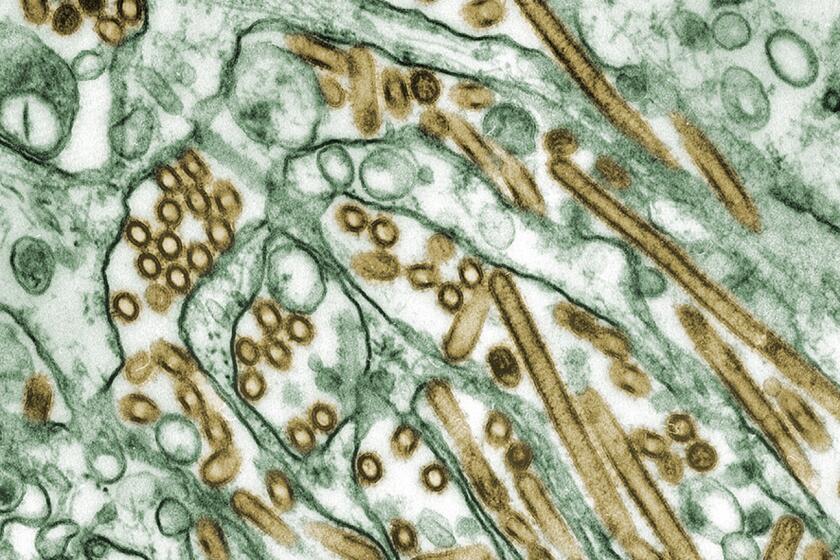Gray Spots on Eyes of Older Dogs Could Be Signs of Vision Problems
Q We have an 11-year-old female poodle that has recently developed gray spots on her eyes. She seems to still be able to see although she sometimes doesn’t notice people who are far away like she used to. Do you think she is starting to go blind? Are these gray spots cataracts? What can be done?
Mrs. Ross Hamilton
Garden Grove
A The gray spots that you describe may be a normal aging process of the lens called lenticular sclerosis.
This is a gradual hardening of the lens and often appears first as a general grayness or haziness of the eye and may become more discrete as the lens continues to harden.
Cataracts are common in older dogs and are often the result of normal aging of the lens within the pupil of the eye. If the cataract becomes mature or very dense, your dog may lose her vision unless the cataracts are removed surgically. In some cases, the cataracts may fall out of position and cause some secondary problems to the iris or anterior chamber of the eye.
I recommend that you have your dog examined by your veterinarian to evaluate the condition of your dog’s eyes. Your vet may want to refer you to a veterinary ophthalmologist for further evaluation of the retina in the back of the eye and possible removal of the lens. Your vet may also want to test your dog for diabetes as cataracts are a very common problem in diabetics.
Q Do dogs dream? I have heard that when dogs dream they move around a lot and it looks like they are having a “seizure.” Occasionally my 9-month-old German shepherd will move around a lot when she is sleeping. Does this mean that she is having a dream? Have any studies been done on dogs that dream?
Peter Hendricks
Huntington Beach
A I am not aware of any current studies being done on dogs or animals for dream or sleep research other than possibly primates. However, it is reasonable to assume that dogs do dream and go through similar stages of sleep that humans do, although those stages may be of different duration or depth. I have noticed dogs go through rapid eye movement (REM) stages when they are asleep and even vocalize and have muscular movements. It would be truly interesting to know what our four-footed companions dream about.
The following is a letter from a lady suggesting ways of dealing with a scratching cat other than surgical declawing:
Being a longtime cat owner, I have discovered that there is a much better way than declawing to protect furniture. Put down one or two of those stiff braided fiber mats per small apartment, maybe more for a larger house. Apparently, the cat thinks it is bark because mine fell in love with the first one she came across, and now that I have two, she never looks at anything else. Also, I have seen advertisements for cat trees with the posts wrapped in sisal fiber rope. Also a sturdy log with the bark still on may be good, but these are less attractive looking to humans.
Juanita Matassa
Santa Ana
Got a question about your pet? Write Dr. Glenn Ericson, Ask the Vet, Orange County Life, The Times, 1375 Sunflower Ave., Costa Mesa, Calif. 92626. Ericson, a practicing Orange County veterinarian, is president of the Southern California Veterinary Medical Assn.
ADOPT A PET
Licorice is a 7-month-old female Labrador mix. The black-coated pooch is gentle, playful, loves people and gets along well with other dogs. She likes to run and needs a fenced yard. She is available for adoption at the Newport Beach Animal Shelter, 125 Mesa Drive, (714) 644-3656. (The adopting family can have Licorice spayed at the shelter for half the regular price.)
Also waiting to be adopted at the Newport Beach Animal Shelter:
Long-haired cat: Sylvester, a black-and-white female, is about 1 1/2 years old, very affectionate, and has not been spayed.
Mixed German shepherds: Lacey, a 4-month-old with a black coat, is lively and playful. Cagney, Lacey’s sister, has a black-and-tan coat.
Labrador retriever: Marlo, a 1 1/2-year-old female with a black coat, loves children. She has not been spayed.
The Newport Beach Animal Shelter is open Monday through Friday from 9 a.m. to 6 p.m., Saturdays from noon to 4 p.m. Fee: $21 plus $20 neutering-spaying deposit, refundable by the city. Adoption agreement allows owners 30 days to return pets having adjustment problems.
More to Read
Start your day right
Sign up for Essential California for news, features and recommendations from the L.A. Times and beyond in your inbox six days a week.
You may occasionally receive promotional content from the Los Angeles Times.






